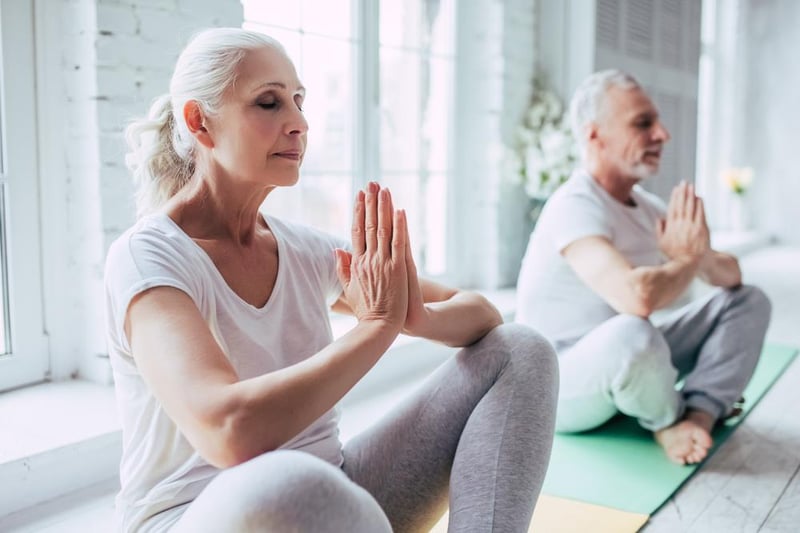THANK YOU!
Get Healthy!

- Sarah D. Collins
- Posted August 3, 2023
Yoga Might Do Wonders for Women's Aging Brains
Yoga is known for its benefits to both the mind and body. And a gentle form of yoga may be an ideal early intervention technique for older women at risk of Alzheimer's disease, new research suggests.
In a small study involving kundalini yoga, participants reported that its stress-relieving effects translated to more efficient memory.
"Women tend to practice yoga more readily than men. And I've done other studies previously in people, older adults with mild cognitive [mental] impairment and in caregivers with similar interventions,"said Dr. Helen Lavretsky, the lead psychiatrist on the study.
"We are focusing now on women who are not as impaired as in my previous study, but still at risk for cognitive decline. And the idea is to get to the level where doing yoga would prevent future cognitive decline and development of Alzheimer's disease,"said Lavretsky, a professor-in-residence at the University of California, Los Angeles.
Kundalini yoga involves chanting, singing, breathing exercises, meditation and gentle poses with the aim of increasing awareness in the mind and body. Previous scientific research has found that yoga can help regulate blood pressure and increase cardiorespiratory fitness, as well as benefit the hippocampus, or the region in the brain that is associated with memory.
In this study, scientists examined the effects of kundalini yoga versus memory enhancement training (MET) on the hippocampus in 22 women mostly in their 60s. All had reported a decline in memory function, and also had one or more cardiovascular risk factors, such as a recent heart attack and diabetes, which are known to increase the likelihood of developing Alzheimer's.
Both the yoga and MET groups had an hour training session a week, in addition to daily homework or practice sessions, for a total of 12 weeks.
Using MRI scans, the researchers studied participants before and after the 12-week period and found that yoga may benefit the region of the hippocampus impacted by stress. They also saw more of an increase in connectivity in the region, compared to participants who did MET, which may suggest long-term neural benefits of the practice.
Participants who did MET, however, were found to have more improvement in their brains than yoga participants when it came to integrating information from their senses into their memories, which, according to the study, could support better memory reliability.
"For years, medical science, certainly neurological science, has felt ways to forestall memory decline [include] eating a healthy diet, not smoking, not drinking too much alcohol, being physically active, being intellectually active "¦ maintaining the best possible cardiovascular health," said Dr. Michael Partnow, a neurologist in Willingboro, N.J. These factors relate directly to what this study is about, he added.
"Speaking to somebody who knows very little about yoga, the type of yoga being described in the article "¦ is both a physical activity with regard to maintaining certain postures, to some degree a physical activity as far as breath control, but also what I'm going to call contemplative activity and stress reduction," Partnow added. "So it's really combining multifactors, which made it all the more convincing for me."
Lavretsky's team has previously found that yoga also benefited depressed patients and patients with mild cognitive impairment, a mental state that can be an early sign of dementia. Several other studies have shown that regular exercise can reduce the risk of developing dementia by around 30% and Alzheimer's disease specifically by around 45%, according to the Alzheimer's Society in the United Kingdom.
And her participants who practiced yoga do notice a difference in their daily lives, said Lavretsky.
"They say typically that they're less stressed and they feel that their memory is more efficient, and they can cope with daily stressors better,"she said. "This is the common kind of finding across the studies, because by training them to do yoga, we are giving them a tool that they didn't have before the study and now they do, that they have a choice of continuing after the study is done. And that's the idea behind this exercise, because they don't require a doctor's visit or a prescription. You know, it becomes their lifelong tool to manage their stress."
Partnow is considering yoga as a tool for himself.
"As an 80-year-old neurologist, I think it may be worthwhile for me to learn yoga,"he said.
The study was published online recently in the Journal of Alzheimer's Disease.
More information
For more on Alzheimer's, visit the U.S. Centers for Disease Control and Prevention.
SOURCES: Helen Lavretsky, MD, MS, geriatric psychiatry, UCLA Health, professor-in-residence, department of psychiatry, University of California, Los Angeles; Michael Partnow, MD, neurologist, Virtua Our Lady of Lourdes Hospital, Willingboro, N.J.; Journal of Alzheimer's Disease, July 19, 2023, online







